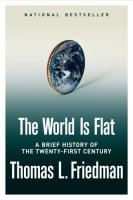 I have just finished reading the book by Thomas Friedman “The World Is Flat“.
I have just finished reading the book by Thomas Friedman “The World Is Flat“.
As you’ve probably noticed I am not a big book freak. I rarely read anything outside of very technical literature. But I felt that I absolutely had to read this one.
I ordered immediately after I saw this video, which is Thomas Friedman’s speech in MIT, in which he talks about the globalization and the flat world. Basically, what he did in MIT, was a very quick and brief overviwe of the first three chapters of the book. His speech was amazing. He was talking in very simple language about really complex things. He made a lot of stuff so much easier to understand. And he made some really interesting connections.
I have to say though, that many of the things he was talking about weren’t new to me. I was thinking about them myself. I just couldn’t possibly form them into any shape or express them in any understandable form.
Friedman did very clearly. And he introduced a lot of examples. And he added a lot of credebility to what he was saying by interviewing a whole lot of smart people.
While the book is written in a very simple language and with a lot of examples, it was difficult to read for me. It was so thought-provoking that I had to stop about every two or three pages for an hour or a day to re-think everything I read. It took me alsmot two month to read 470 pages. And I am sure I’ve missed a lot too. I’ll have to re-read it in the near future.
This is the most complete and wide view of globalization that I have come across. Ever. The book doesn’t just talk and talk about some abstract forms. It shows the very specific connections between events that happened throughout the human history, with more focus on the last 30 or so years. All events and connections are looked at from a multitude of angles – political, economical, cultural, technological. Each of those angles is futher down broken into a multitude of options. Examples from American, Japanese, Chinese, Indian, African, and European cultures are given. Interviews were conducted with a whole lot of people from ex-presidents and current ministers to CEOs of international corporations to religious leaders, as well as plenty of common people from a multitude of backgrounds.
Globalization aside, this book is the best piece of journalism that I’ve read in a long long while. A job well done. Truly a bestseller. I would seriously recommend this book to anyone. Yes, to anyone. Not only people who are interested in globalization, but to all people who are interested in their own present and future. There are lots of questions, and there are lots of answers. You’ll surely understand the world better after reading this book.
I do.
